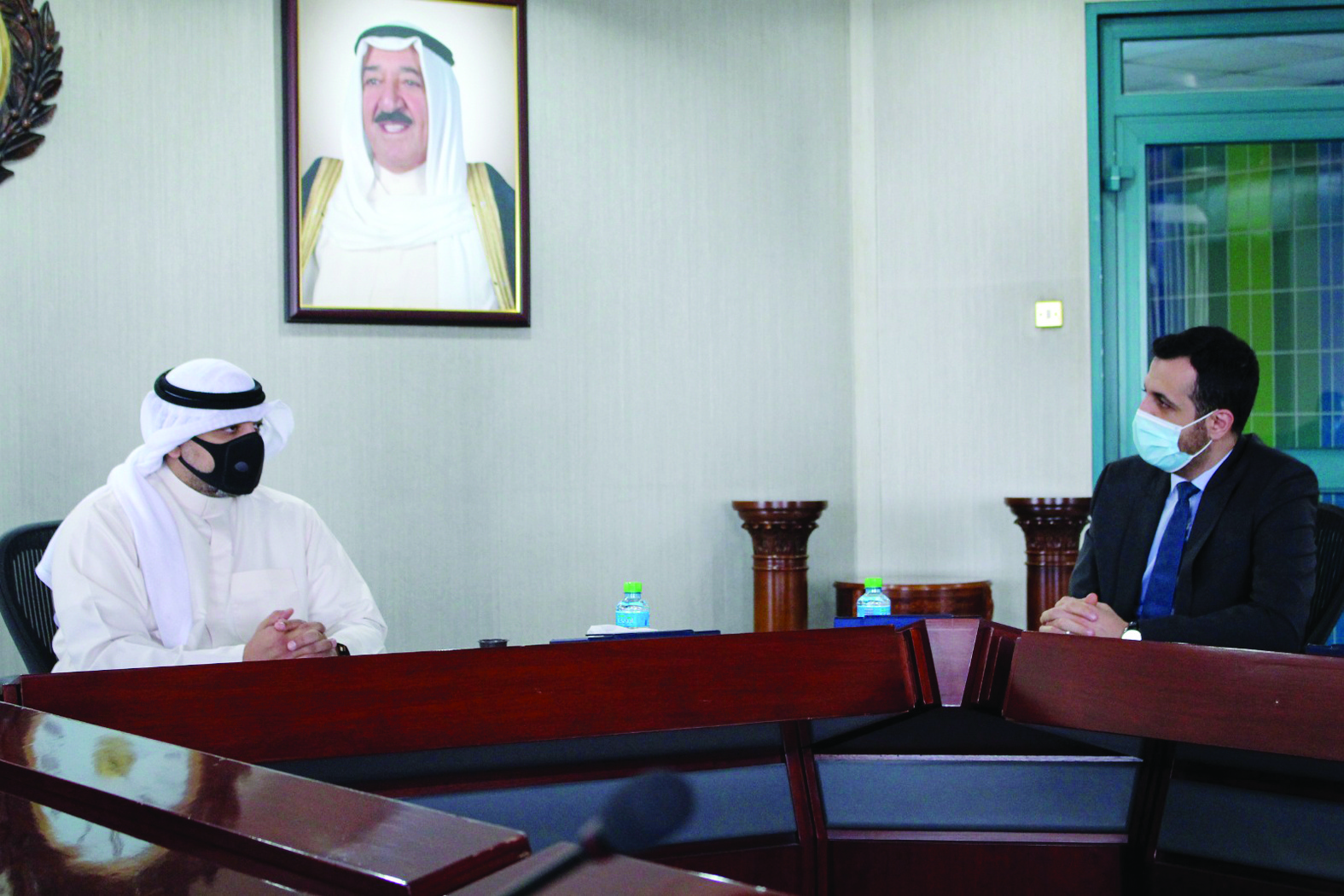

KUWAIT/BEIRUT: Director General of Kuwait Ports Authority (KPA) and President of the Arab Sea Ports Federation Sheikh Yousef Abdullah Sabah Al-Nasser Al-Sabah said Tuesday the KPA is ready to provide all necessary assistance for the re-operation of the ports of Tripoli, Sidon and Tyre in Lebanon. This was brought up in a press statement by Sheikh Yousef Abdullah, who is also CEO of the Arab Academy for Science, Technology and Maritime Transport (AASTMT), on the sidelines of his meeting with Lebanese Charge d'Affairs to Kuwait Basil Oweidat.
Sheikh Yousef Abdullah said that Kuwait places its expertise in the field of food security at the disposal of the Lebanese side, as it ranks first in the Arab world in this field, indicating that the General Secretariat of the League of Arab States has an initiative to develop the food security system for any Arab country based on the experience of Kuwait.
He mentioned that the Kuwait Fund for Arab Economic Development (KFAED) and Kuwait Flour Mills and Bakeries Company were addressed to implement this initiative, as the response of both sides was affirmative, underlining that if Lebanon requests Kuwait's expertise in food security, those parties will not hesitate to help accordingly. He pointed out that the unfortunate explosion of the Beirut port is the right time to activate this initiative, to return to what it was in the year 1968.


Assisting Lebanon
During his meeting with Oweidat, the mechanisms of Kuwaiti ports assisting Lebanon were discussed in wake of the Beirut port explosion, as the authority offered to provide various training and logistical assistance, including training Lebanese cadres in operating bridge cranes, towing, pilotage and other marine works. The reconstruction and re-operation of the port was also discussed in coordination with KFAED, working on developing and rehabilitating the rest of the Lebanese ports in the regions of Tripoli, Sidon and Tyre, and providing all economic and strategic studies in the field of port development for the Lebanese side, he added.
In a similar press statement, Oweidat greeted and thanked Kuwait, the leadership and the people, for their quick response after the explosion, whether by operating an air bridge or providing health and medical supplies or through the Kuwait Red Crescent Society initiative. Oweidat considered that this Kuwaiti concern towards Arab countries is not surprising in the country of humanity, especially in periods of crisis, noting that Kuwait has always been the first supporter of its Arab neighbors, especially in crises.
He indicated that the initiative of KPA to offer its assistance to Lebanon was among the first initiatives in this regard, explaining that the meeting with the KPA's chief discussed ways of cooperation and assistance that Lebanon needs to restart the Beirut port and operate other Lebanese ports.
Kuwaiti aid
In other news, two Kuwait Air Force planes carrying humanitarian aid left Kuwait yesterday, heading to Lebanon in order to meet the needs of people affected by Beirut's blast. The two planes carried more than 105 tons of food, to reach a total of 610 tons carried by 13 aircrafts since the Beirut explosion. Two Kuwait Air Force planes had landed on Tuesday at Rafic Hariri International Airport on Tuesday, carrying more than 105 tons of food as well. Kuwaiti's relief aid since the incident includes food and medical supplies, said Abdullah Al-Shaheen, a counselor at Kuwait's embassy in Lebanon, adding that more planes carrying aid to Lebanon are expected to leave Kuwait in the coming days.
Separately, Kuwait Red Crescent Society (KRCS) continued its relief efforts on Tuesday by distributing 500 food baskets to families affected by the recent Beirut port explosion, in addition to medical equipment to hospitals. Head of the KRC mission in Lebanon Dr Musa'ed Al-Enezi reiterated that this aid aims to reduce the sufferings of affected families.
He considered that providing hospitals with medical equipment and devices would help reduce the impacts of the disaster and enable them to continue their medical services. Enezi referred to KRCS' cooperation through its field team, which flew to Beirut immediately following the blast, with the Lebanese Red Cross in coordination with the Kuwaiti embassy in Lebanon.
Several Lebanese families thanked Kuwait and its people for the prompt relief response, stressing the importance of distributing help directly to those who were affected by the blast. KRCS provided medical supplies to five damaged hospitals; Saint George Hospital, the Lebanese Hospital Geitaoui, Wardia, Karantina and Makassed General Hospital. - KUNA


